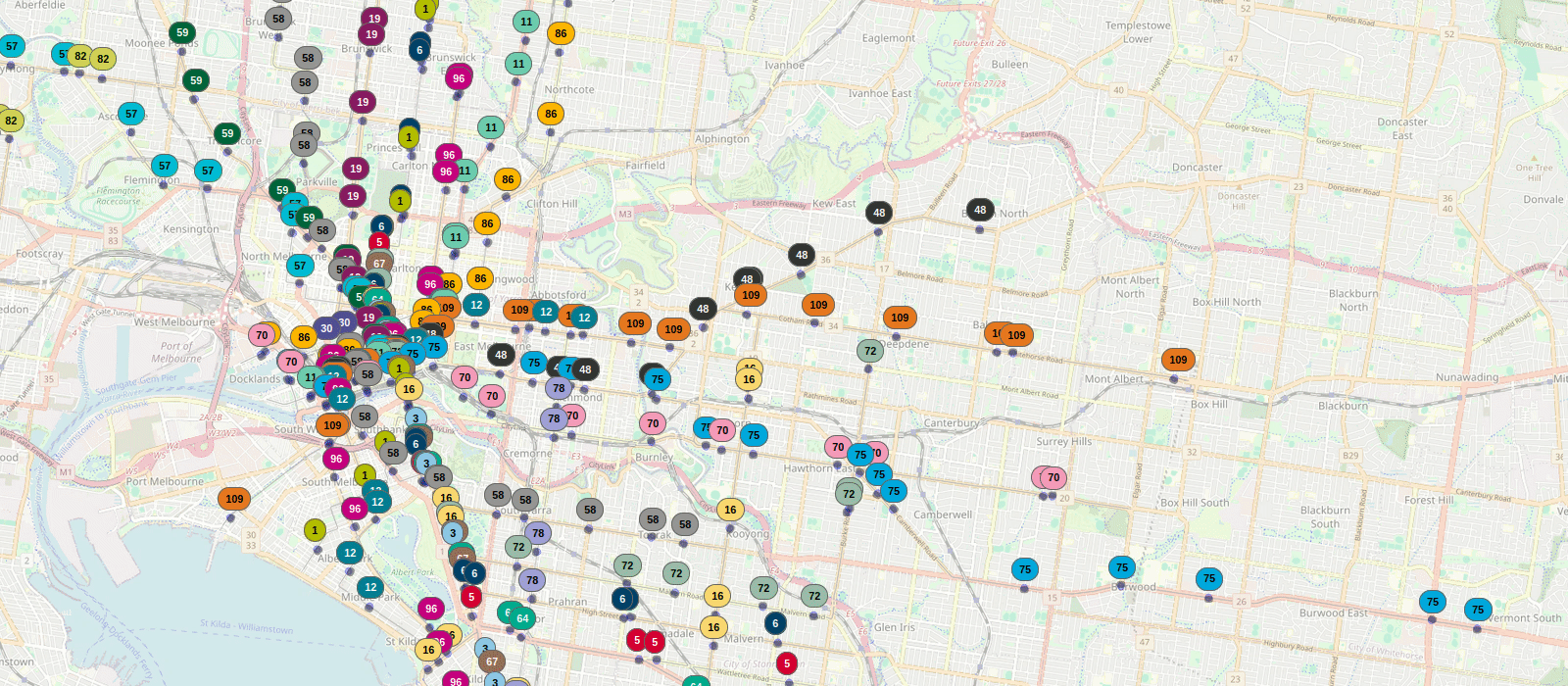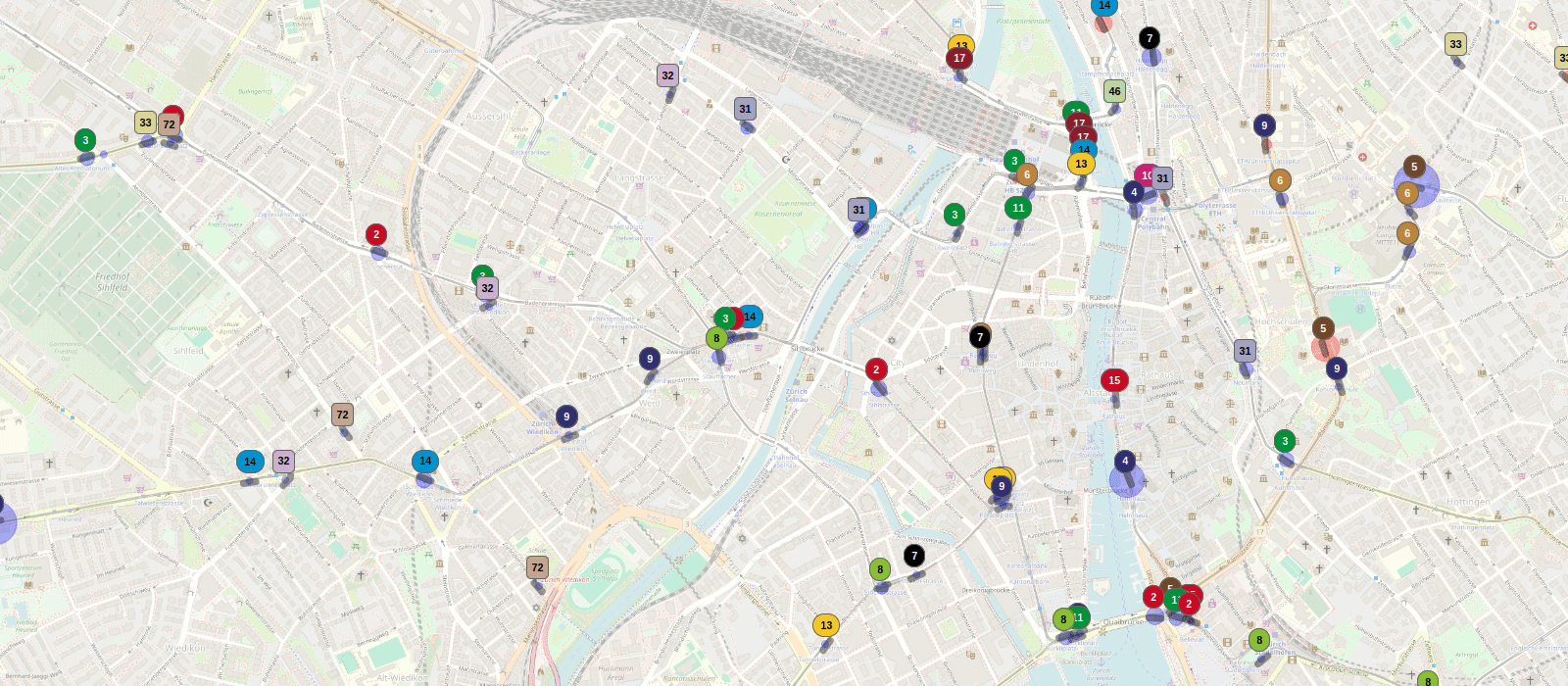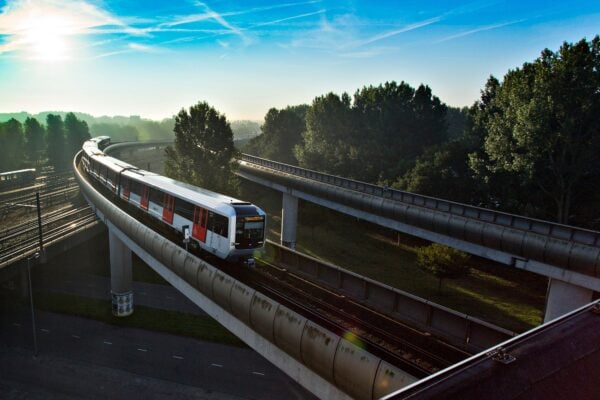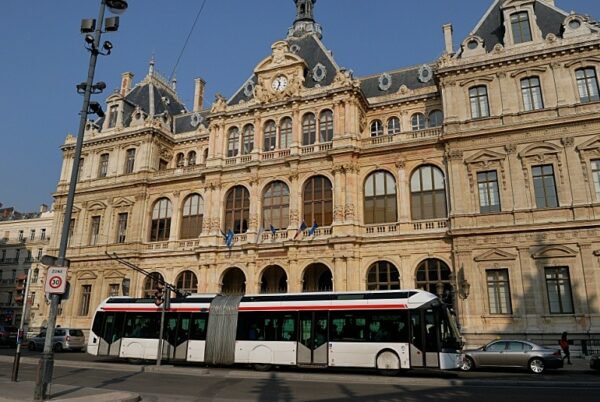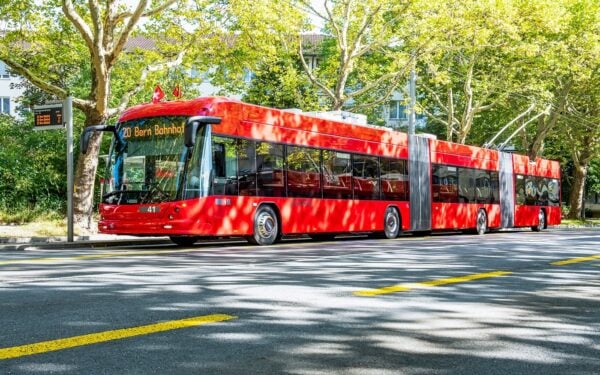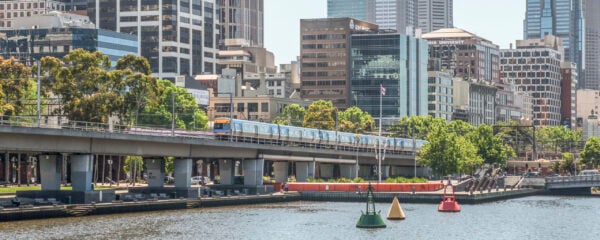System studies for traction power systems
Traction power systems are an essential part of modern rail transport. They provide the electrical energy for the traction of trains and are therefore crucial for the mobility and efficiency of rail transport. The planning and design of traction power systems requires careful consideration and calculation to make the energy supply reliable and efficient.
The planning of traction power systems involves a variety of tasks, including network calculations, simulations and dimensioning.
Network calculations for the design of railway power supply networks
Enotrac carries out network calculations for the design of railway power supply networks. These serve to determine the optimal structure and size of the power supply network. This includes determining the appropriate voltage and frequency of the traction current and dimensioning the individual components of the network in accordance with the applicable EN standards.
One of the biggest challenges in calculating the network is to take into account various factors. These include traction requirements, topographical conditions, power losses in the network, the availability of energy sources and safety aspects. Network calculations are therefore a complex process that requires specialised software tools.
Conceptual design, simulation and dimensioning
The conceptual design, simulation and dimensioning of traction power systems are closely linked. The conceptual design involves defining the basic structure of the traction power system, including the voltage and frequency. Simulation makes it possible to analyse the planned system in different operating scenarios in order to verify performance and reliability. Dimensioning refers to the selection and design of the system’s components, such as substations, lines and protective devices.
One of the important decisions in the design concerns the choice of rail voltage and frequency. This choice has an impact on the efficiency of the system, the costs and the compatibility with the vehicles used.
Taking the applicable EN standards into account
In the rail industry, compliance with standards and regulations is of the utmost importance, as these are crucial for the planning and design of rail power systems. In particular, EN standards such as EN 50388, EN 50163, EN 50122 and EN 50329 have an enormous influence on the design of rail power systems.
The EN 50388 standard defines requirements related to the electrical aspects important for technical compatibility between railway vehicles and electric traction power supply systems. It covers, among other things, the protection principles between the power supply and traction units, power factors, current or power limits, coordination of circuit breakers and interaction with harmonics and dynamic effects.
EN 50163 specifies the main parameters for the supply voltages of railway systems, including the fixed installations for the supply of traction current and the rolling stock. It is applicable to various systems of electric railways, including railways, light rail, trams or elevated and underground railways.
The EN 50122 standard specifies protective measures related to electrical safety in fixed installations connected to AC and/or DC railway power supply systems. It also covers installations that may be endangered by electrical railway power supply installations. This standard is relevant for new lines and major modifications to existing lines in various electrical railway systems.
The EN 50329 standard specifies performance requirements for traction transformers used in traction substations or along the line for AC or DC traction power supply or to provide power for auxiliary services. This standard includes requirements for the suitability of transformers and auto-transformers for the intended load cycles and their power ratings.
Compliance with these standards is essential for the safety, quality and interoperability of rail power systems. These standards are necessary to obtain approval for railway lines and to enable safe operation. When planning rail power systems, it is therefore extremely important to explicitly take into account the relevant EN standards. This ensures that the highest standards in the rail industry are met and that smooth operation is possible.
Specialised software tools for network calculations: Fabel
Fabel is a specialised software from Enotrac, developed for the demanding task of network calculations in rail power systems. This powerful software package, which focuses specifically on the analysis, planning and dimensioning of electrical traction power supplies, offers a wide range of functions.
Fabel integrates various modules that cover a wide range of use cases. These modules enable network calculations, load studies to optimise power supply and energy studies to evaluate energy-efficient measures. The software is tailored to the needs of the rail industry and is divided into modules such as ‘load flow calculations’, which enable detailed operational simulations of rail power systems and support the planning, optimisation and dimensioning of power supplies. The ‘MTL module’ offers precise modelling of the conductors in the traction power supply and takes into account interactions, both static and dynamic. In addition, ‘emfcalc’ and ‘emfcalc3d’ are included to assess the impact of the magnetic field on the area around the railway line in two-dimensional and three-dimensional spaces. The ‘optidrive module’ enables the development of energy-efficient driving profiles based on given timetables.
FABEL thus offers a comprehensive solution that ensures that the power supply in railway power systems functions reliably and efficiently, that bottlenecks are avoided and that innovative energy-efficient measures can be developed.
Load studies with FABEL
Load studies are used to ensure efficient and reliable traction power supply. FABEL provides a powerful solution for conducting these studies to accurately analyse the energy demand in different operational scenarios and ensure that the power supply system meets the requirements.
With Fabel, load studies can be carried out in a way that greatly facilitates the planning and optimisation of the traction power supply. Fabel’s multi-conductor module enables detailed modelling of all conductors in the traction power supply. This accurately captures the interactions between the conductors, taking into account the power drawn by the trains in the network, at every time step of the simulation and at every location.
This module allows for both ‘static’ and ‘dynamic’ load flow calculations. In ‘static’ calculations, operational or route simulations are not taken into account and fixed currents are applied. In contrast, ‘dynamic’ calculations take into account the actual operating conditions and the variable power consumption of the trains.
The multi-conductor simulation also makes it possible to directly calculate the voltages induced on third-party systems by rail operations. This means that, for example, the effects on cables of safety systems or parallel metallic conductors for water, oil and gas running alongside the railway tracks can be precisely determined.
Energy studies with Fabel
Energy studies can be used to improve the energy efficiency and sustainability of the rail power supply. Fabel provides a powerful platform for conducting these studies and developing concrete measures to reduce energy consumption, optimise energy use and integrate renewable energies.
An exemplary project with the Basel Transport Authority (BVB) illustrates how Fabel supports this. BVB realised that a significant proportion of the energy generated during the braking process was lost in the tram vehicles’ braking resistors. The challenge was to minimise this energy loss and make the tram system more energy efficient.
By using Fabel, various energy optimisation measures were analysed in detail to evaluate their specific benefits. These included increasing the recuperation voltage on the vehicles, optimising the network switching, increasing the system voltage from 600 V to 750 V, enlarging the cross-section of the overhead contact line and implementing vehicle-based and stationary energy storage and inverter systems at suitable locations in the network.
The benefits of each measure were evaluated by means of extensive simulations in which the energy consumption in the entire tram network was analysed. These results were compared with the data from baseline simulations to determine the amount of energy saved and the technical benefits. The study took into account average loads in order to obtain realistic annual energy consumption values. The economic analysis proved the profitability of the proposed measures, which led to the development of a comprehensive package of measures. This package was proposed to BVB for implementation.
Fabel makes it possible to carry out energy studies accurately and efficiently in order to increase energy efficiency in rail transport. The platform supports the identification of energy-saving potential and the implementation of sustainable strategies that reduce the demand for conventional energy and promote the integration of renewable energies.
Design of overhead line protection based on short-circuit calculations
Overhead line protection is an essential aspect of rail power supply. To ensure that the overhead line is protected in the event of faults or short circuits, short-circuit calculations are carried out. These calculations help to size the necessary protection devices and protection equipment and ensure that they function effectively in the event of a short circuit.
Design of return conductor systems: personal protection and protection against stray currents
The design of return conductor systems is an important aspect of rail power supply, especially for DC railways. These systems are used for personal protection and to protect against stray currents. Personal protection ensures that no dangerous voltage occurs on the rails or other parts of the railway infrastructure that could be touched by people. Protection against stray currents prevents unwanted electrical currents from entering the environment, which can lead to corrosion of metallic structures.
Electrical railway infrastructure projects
Enotrac is involved in a number of electrical rail infrastructure projects worldwide. The electrification of railway lines, the conversion of diesel trains to electric operation, and the integration of renewable energies are important areas of focus. The planning and development of electrical rail networks requires specialised knowledge and tools such as Fabel.
Holistic approach to rail infrastructure
Enotrac pursues a holistic approach to the planning and development of rail infrastructure. This includes considering economic, ecological, and social factors in addition to purely technical aspects. The development of sustainable rail infrastructure is the goal to meet the requirements of society and the environment.
Energy efficiency in rail transport
Improving energy efficiency in rail transport is an important concern for Enotrac. It includes the development of energy-optimised driving profiles, the implementation of energy recovery systems, and the reduction of energy losses in the energy supply. These measures help to reduce operating costs and protect the environment.
The planning of traction power systems faces various challenges. The integration of renewable energies, the digitalisation of railway operations and the electrification of railway lines are important topics. The increasing demand for mobility and the need to minimise environmental impacts require continuous developments in the railway industry.
The planning and design of traction power systems is a complex process that requires specialised tools such as Fabel. The correct choice of rail voltage and frequency, the design of overhead line protection systems and the consideration of standards are important to create a safe and efficient traction power system. Enotrac is a leader in the development of maintenance concepts and electrical rail infrastructure projects that take a holistic approach and promote energy efficiency in rail transport. The rail industry is challenged to find innovative solutions to the current challenges and future prospects in order to make rail transport sustainable and ensure future mobility.


